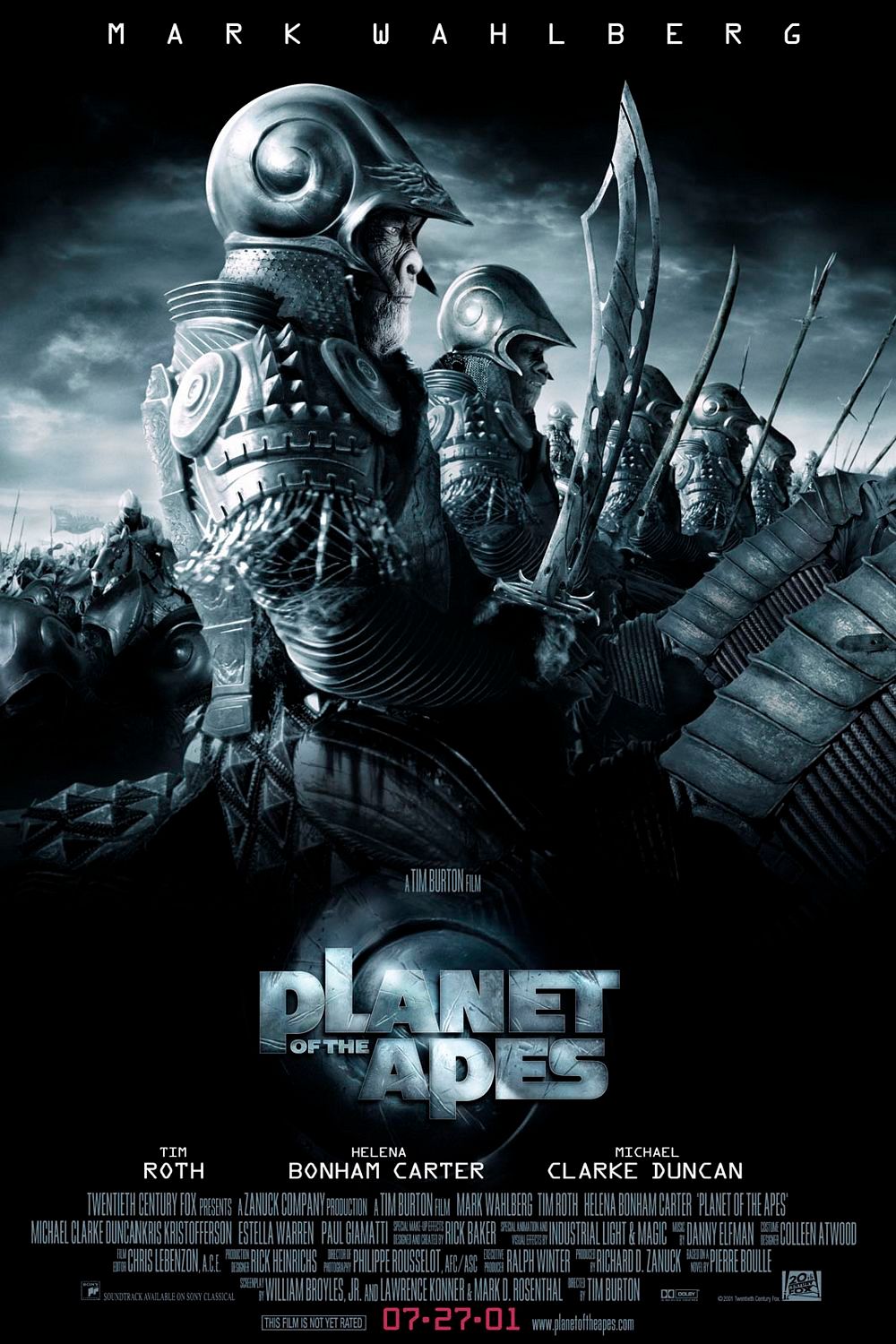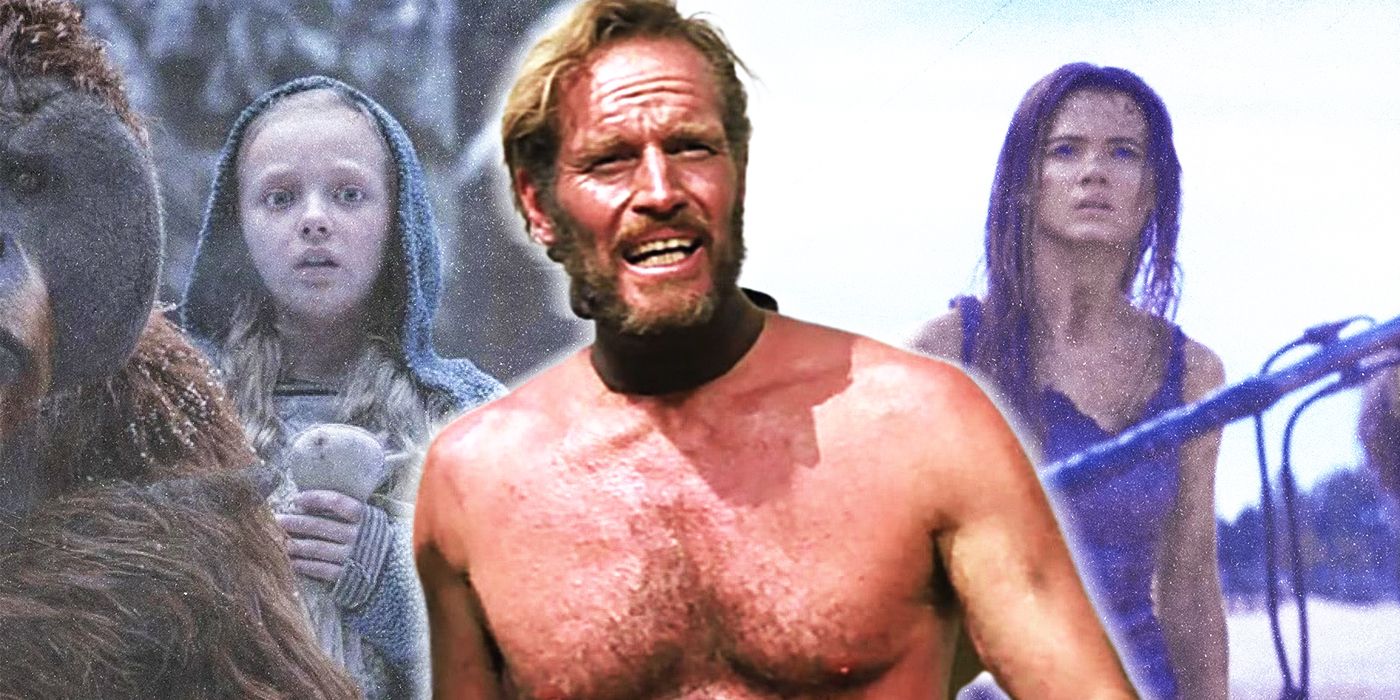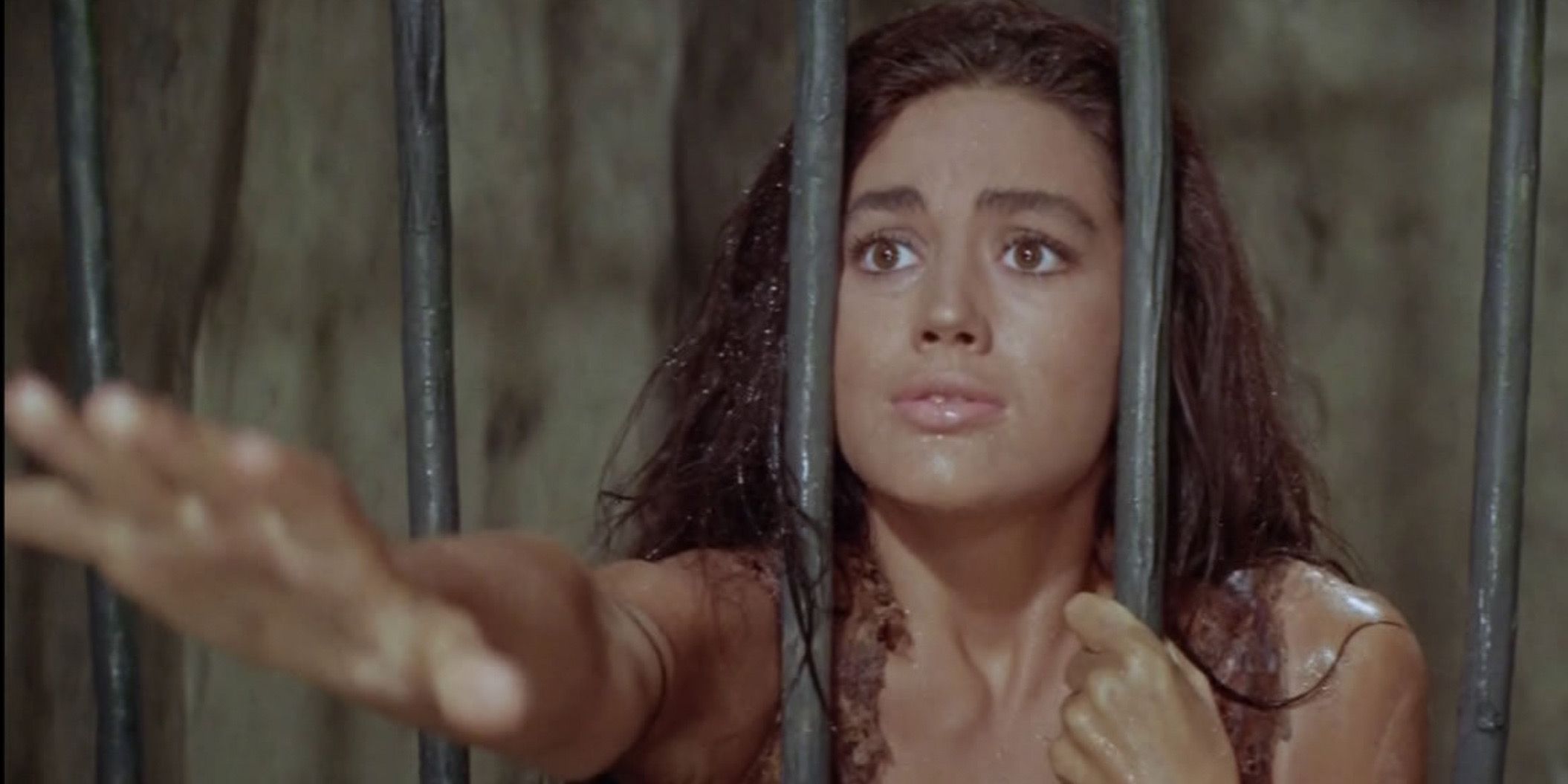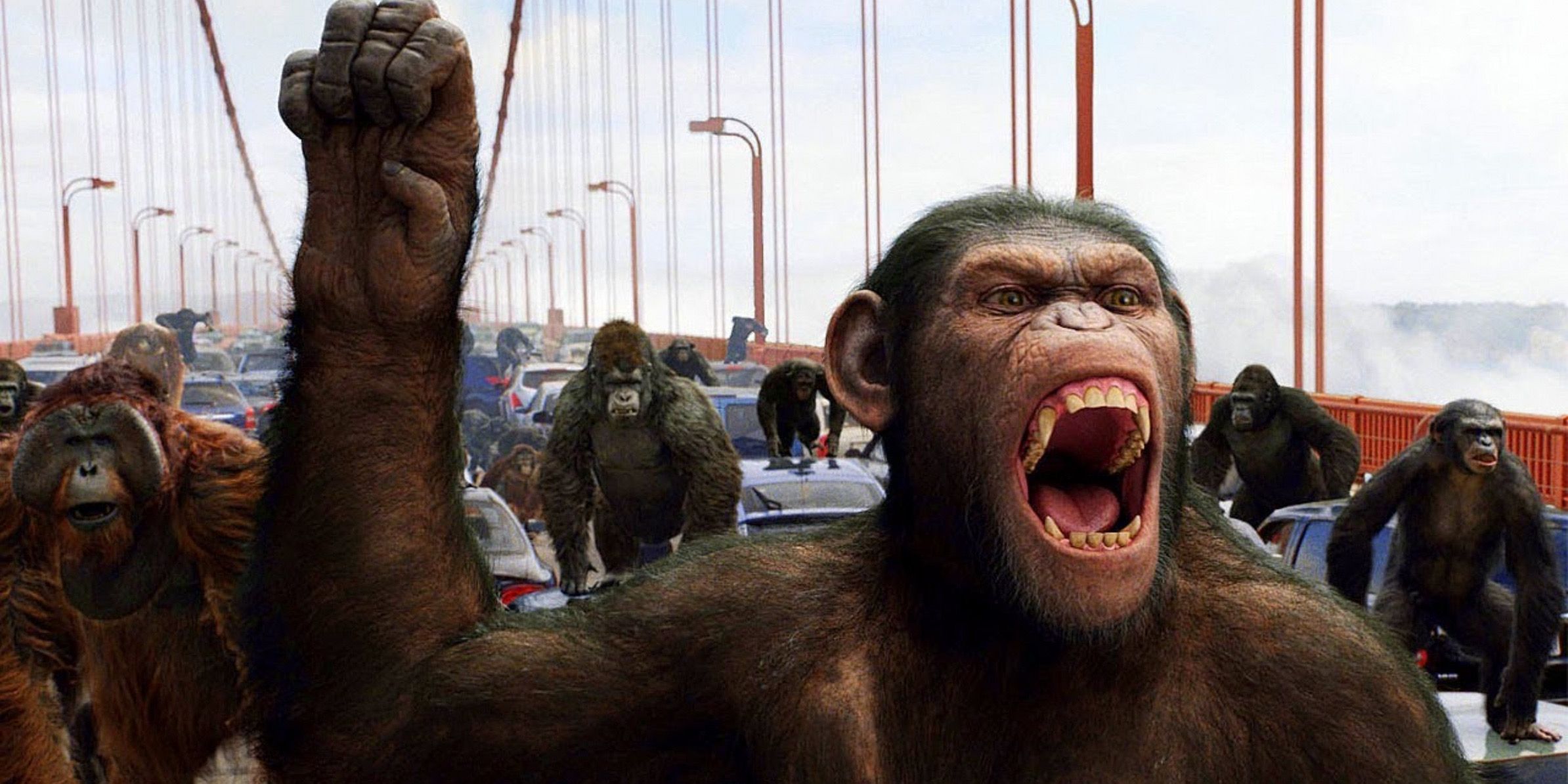The original 1968 Planet of the Apes, based on the book by author Pierre Boulle, depicted a post-apocalyptic Earth where apes and humans lived inverted roles. But in both the book and the film, there's never been an explanation for humans not being able to speak, and the franchise — which eventually spawned five films — never really explored the question.
However, the rebooted Apes trilogy — Rise, Dawn, and War for The Planet of the Apes —\ crafted an explanation for the phenomenon. In the films, the "simian flu" that rapidly spreads around the globe eventually affects the humans' vocal cords to the point they are unable to talk. It eventually affects their higher intellect as well: rendering them little more than animals by the end of the final film. It puts an end to a good deal of speculation around the question, which none of the previous incarnations of the story properly addressed.
Updated on April 20, 2024 by Robert Vaux: The Planet of the Apes franchise has undergone several reboots over the years, with the precise nature of its universe shifting depending on who's telling the story. As such, it can be very difficult to pinpoint why or when human beings devolved into animals. The article has been expanded to discuss the ways earlier Apes projects have addressed the issue, and what the answers from the more recent trilogy might say about future entries in the franchise. In addition, the formatting has been updated to match current CBR guidelines.
Planet Of The Apes Depends On Human And Ape Switching Places
|
Title |
Directed by |
Written by |
Running Time |
Release Date |
|---|---|---|---|---|
|
Planet of the Apes |
Franklin L. Schaffner |
Michael Wilson & Rod Serling |
112 minutes |
April 3, 1968 |
|
Rise of the Planet of the Apes |
Rupert Wyatt |
Rick Jaffa & Amanda Silver |
105 minutes |
August 5, 2011 |
The franchise stretches back to the original novel La Planete des singes by French author Pierre Boulle. He intended it as a satire in the tradition of Johnathan Swift, as a human expedition lands on a different planet — passing centuries in just a few years during transit, owing to time dilation — only to find it controlled by intelligent gorillas and chimpanzees. The expedition's lone survivor eventually returns to Earth, only to find it controlled by intelligent apes as well. He writes his story down and commits it to the stars, where it's found by a pair of chimpanzee astronauts. They dismiss it as rubbish, calling it inconceivable that humans could ever become intelligent.
La Planete des singes goes into specifics about the cause, though Boulle adheres more to Swiftian fairy-tale logic than evolutionary science. According to the book's version of Doctor Cornelius, long-ago humans on the planet tamed apes for use as servants, only to concede increasingly complex tasks to them out of intellectual laziness. That took its toll over the course of generations as humanity declined and apes ascended. Eventually, the apes rose up, driving the humans into camps and then into the wilderness. By then, the role reversal was complete, and humanity had become the brute beasts that apes once were. In the novel, one of its most intelligent characters, Professor Antelle, disappears and is found near the end of the story in a cage. His mind is corrupted and so is his physical state — his brilliance is completely stripped away. How long could a person survive in such conditions until completely losing his mind and voice?
Although there aren’t any other species capable of talking, humans are living on planet Earth with complete hegemony. If that were to change, as it does in Planet of the Apes, things would be pretty bleak for humanity. Therefore, The Plant of the Apes stripped humans of their voices as a metaphor. When crafting a story, sometimes the decisions made aren’t based on a logical explanation but one that would make sense for the core of the storyline. Humans don’t have a voice in the society of the apes, both physically and metaphorically. They’ve lost it because they’ve been reduced to the lowest of levels, underscoring Boulle's point that civilization and intellectual capacity aren't set in stone.
The First Planet Of The Apes Movies Keep The Cause A Mystery
1968's The Planet of the Apes adheres to much of the novel's story and essence, with a few mild changes. (Ape technology is rendered less advanced than it was in the book for budgetary reasons, for instance.) The biggest change — and the only one that alters the trajectory of the book — is the famous final twist. The planet where the space travelers land is actually a future Earth where simians have taken control after a nuclear war. Exposure to radiation could have damaged the humans' vocal cords over time and affected their intelligence as well. But it should have damaged the simians' intelligence too, leaving something of a logic hole.
Another theory pins their inability to speak on devolution: humans went from laborers to slaves then from slaves to pets. This stems from Boulle's explanation in the book, though the first cycle of Planet of the Apes sequels never goes into specific detail about the cause. However, it does follow Boulle's societal descent, with Conquest of the Planet of the Apes depicting a future society in which apes have become servants, and Battle for the Planet of the Apes depicting a much-diminished humanity struggling for dominance with the apes after a nuclear war. It suggests that mutation and radiation ultimately robbed people of their ability to reason, though again, it doesn't explain why apes were unaffected.
The expanded universe explains that the relationship between the two species degrades over time, even if there's an ape called Caesar who pushes for equality between the two. Centuries of demoralization and frustration resulted in humans' receding intelligence and willpower, which would have led to their voices being ever more shut until losing them completely. That's borne out in the short-lived television series, which depicts apes as dominant, but humans still capable of reason (and making a general symbolic stand-in for oppressed minorities in the real world). Similarly, the 2001 Planet of the Apes explains the differences in very vague terms, with the intelligent apes descended from lab specimens on a spaceship. Humans are depicted as reasonably intelligent, but primitive, and regarded as pets or slaves by the more technologically advanced apes.
The Planet Of The Apes Reboot Trilogy Answers The Question At Last
For the latter-day trilogy, a firm and logical answer proved best. The films' hero, Caesar, is the product of an experimental drug called ALZ-112: originally designed to cure Alzheimer's disease. Taken away from the kindly scientist studying the drug, he quickly engineers a revolt among his fellow simians: enhancing their intelligence to match his own and breaking free of the facility that holds them. After a brutal battle with human police on the Golden Gate Bridge, the apes escape to Muir Woods where they take refuge among the giant redwoods.
The presumed military response is cut short by an ominous development. Humans have been exposed to AZL-112, and it swiftly spreads across the globe thanks to an infected airline pilot. The two sequels cover the fallout of the ensuing pandemic, as the "simian flu" wipes out most of humanity and leaves the survivors struggling for dominance against Caesar and his apes. War for The Planet of the Apes concludes the trilogy with the reveal that the simian flu has mutated, and will soon render the surviving humans incapable of higher intellectual thought.
The virus makes a convenient plot device, but the films invest it with enough logic and organic plausibility to cover any lingering questions on the matter. It works so well that War for The Planet of the Apes could almost segue directly into the 1968 film — answering the question of what Earth looks like 2000 years later — with just a little tweaking. The latter-day trilogy even makes reference to a deep space mission matching the name of the one in the original. With it, the issue of how the franchise's primary conceit of a planet where apes are intelligent and humans bestial finally has a proper origin.
The Planet of the Apes movies are currently streaming on Hulu.

Planet of the Apes
The Planet of the Apes franchise began as a novel by French author Pierre Boulle, which was adapted in 1968 as a feature film that went on to build a franchise that spans more than five and a half decades.
- Created by
- Pierre Boulle
- First Film
- Planet of the Apes (1968)
- Latest Film
- War for the Planet of the Apes
- Upcoming Films
- Kingdom of the Planet of the Apes
- First TV Show
- Planet of the Apes
- Latest TV Show
- Return to the Planet of the Apes
- First Episode Air Date
- September 13, 1974
- Genre
- Science Fiction



